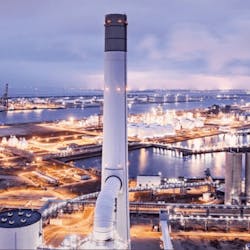Plug Power designing 100-MW Electrolyzer for Uniper H2 plant in Netherlands
U.S.-based Plug Power has been selected by German energy firm Uniper to design the electrolyzer technology for its Maasvlakte site at the Port of Rotterdam in the Netherlands.
Uniper says it aims to install 100 MW of Plug Power electrolysis capacity at the Maasvlakte Energy Hub to generate green hydrogen by 2026, with plans to increase the capacity to 500 MW by 2030.
Under the agreement, Plug will supply 10 prefabricated proton exchange membrane electrolyzer arrays for Uniper’s flagship project H2Maasvlakte.
“The H2Maasvlakte project marks a significant milestone for Europe’s transition to more sustainable, localized energy in response to geopolitical risk and climate change,” said Andy Marsh, CEO of Plug. “Plug is fully committed to a green hydrogen future and our electrolyzer technology has a proven track record of helping customers produce green hydrogen at scale.”
Plug will manufacture the electrolyzer technology for H2Maasvlakte in both the European Union and the U.S. The front-end engineering design (FEED) study, currently being performed by Uniper with Technip Energies, is supported by Topsector Energie subsidies of the Dutch Ministry of Economic Affairs and Climate.
“Uniper is striving for a carbon-neutral portfolio by 2035,” said Axel Wietfeld, CEO of Uniper Hydrogen. “Our flagship project H2Maasvlakte contributes significantly to this.”
According to Uniper, the Rotterdam Harbor area, including the Maasvlakte, is the largest carbon-emitting industrial cluster in the Netherlands, and decarbonizing it would significantly contribute to the country’s target goal of achieving net zero by 2050. Hydrogen does not contain carbon in its molecular chain and thus does not emit CO2 when combusted, but to be considered "green" it must be created by electrolyzers powered by carbon-free resources.
In 2021, Uniper and energy giant Shell announced a memorandum of understanding to work together on developed H2Maasvlakte. Shell also had announced a major investment in a project at H2Maasvlakte to produce up to 60,000 kg of renewable H2 per day.
The renewable power for the electrolyzer would come from the Hollandse Kust offshore wind farm. Shell's Holland Hydrogen I plant is expected to be operational by 2025, according to reports.
